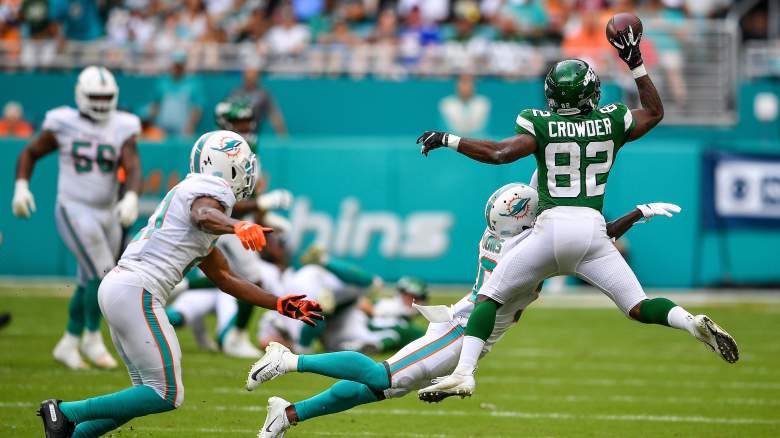
Getty Jamison Crowder makes a one-handed catch against the Miami Dolphins on November 3, 2019.
The NFL’s June 1 deadline is upon us, and for New York Jets fans, that means Jamison Crowder is the name to watch.
The Jets slot receiver has been one of the rare offensive success stories of the past few seasons, but his $11.375 million cap hit could put him on the outs in New York despite that.
Should the Jets move on from Crowder? Assuming they are unable to trade him, here are all the pros and cons of releasing the six-year pro.
Pro: Newfound Cap Space
Obviously the main positive from cutting Crowder would be the $10 million-plus cap space that the Jets can free up from making the move. He only has one year remaining on his contract, and the dead cap hit is only $1 million for the Jets if they decide to part ways.
This could be useful if general manager Joe Douglas has his eyes on any other big-name targets that are currently available. The most popular name on that list might be Julio Jones, who’s being courted by many fan circles and franchises across the nation.
Jones is set to cost $15.3 million guaranteed in 2021 ($23.05 million cap hit), with an extra $2 million guaranteed in 2022 and a possible cap hit of $19.263 million.
Of course, another name could be offensive tackle Morgan Moses, who met with the Jets last week according to Ian Rapoport.
The cornerback position could easily be addressed with this money too if Douglas ultimately chooses to bring in a veteran like Steven Nelson or Richard Sherman.
Other areas of need are backup quarterback and linebacker. The Chicago Bears have made attempts to trade Nick Foles after landing Justin Fields in the draft, but his contract has proven meddlesome, with a higher dead cap hit than the $6.66 million hit they incur by holding onto him.
At linebacker, K.J. Wright and Kwon Alexander are two free agents that fit this system brilliantly, and both would add poise and experience alongside C.J. Mosley.
Con: Catch Rate & Efficiency
As mentioned in the open, Crowder has been one of the only Jets playmakers to live up to expectations in recent years. Outside of the games he’s missed (more on this below), the slot has had a solid catch rate and offensive output with the Jets.
A favorite of Sam Darnold, Crowder caught 63.9% of passes for 833 yards in 2019 (78 receptions) and 66.3% of passes for 699 yards in 2020 (59 receptions). His yards per game of 58.3 was actually higher during his second season with the Jets, but unfortunately, he did not appear in as many games.
This two-year performance led the Jets in nearly every receiving category in both 2019 and 2020, ahead of players like Robby Anderson, Breshad Perriman and Denzel Mims.
Pro: Crowder’s Replacement Is Already on the Roster
When stud wide receiving prospect Elijah Moore fell to the Jets in the second round, it was a clear signal that Crowder’s days may be numbered. Douglas didn’t sign him in the first place, which is generally “strike one” in the NFL. “Strike two” is the obscene contract that former Jets general manager Mike Maccagnan paid Crowder.
Although none of these “strikes” are Crowder’s fault, they count against him all the same.
Moore shares some similarities with Crowder and has been compared to San Francisco 49ers playmaker Deebo Samuel. Former Niners’ passing game coordinator Mike LaFleur has brought his system to New York. He also probably had a hand in drafting Moore. All this points to Crowder getting phased out of this offense in 2021.
Keelan Cole, Vyncint Smith, Jeff Smith and Braxton Berrios also offer cheaper inside options at receiver that are already on the roster, each one being much more cost-effective than Crowder.
Con: Can Never Have Enough Weapons for a Rookie QB
For the entire Darnold era, all fans ever talked about was the lack of weapons around the young quarterback. Zach Wilson’s tenure as the Jets signal-caller has been very different from the get-go.
The Jets have a deeper wide receiving core than they’ve had in a long time, which includes the names above, but also added a big-money acquisition like Corey Davis. It’s never bad to have an embarrassment of riches in a sport like football. Injuries occur. Players need rest during games. Different skillsets work better against different opponents.
Whatever the reason, it’s useful to have a player like Crowder in the offense, especially if the Jets aren’t planning on replacing him. The speedster has the versatility to run any type of route, and he also makes for a reliable safety net, something Wilson will appreciate in year one.
Pro: Injury History
Crowder has always been a talented athlete that runs tremendous routes and racks up plenty of catches, but his main issue over the past few years has been staying on the field.
This trend only began for the slot option in 2018, his fourth season in the NFL, but it carried over into his time as a Jet. Crowder missed four games in 2020 and 11 games over the past three seasons.
For a receiver with an $11 million-plus cap hit who’s only third or fourth on the depth chart, this injury risk may become more trouble than it’s worth.
What would YOU like to see happen with Crowder? Let us know on Facebook @HeavyOnJets, or Twitter @obermuller_nyj and @BoyGreen25.
READ NEXT: Ex-49ers Pass-Rush Specialist Reunites With Jets Robert Saleh